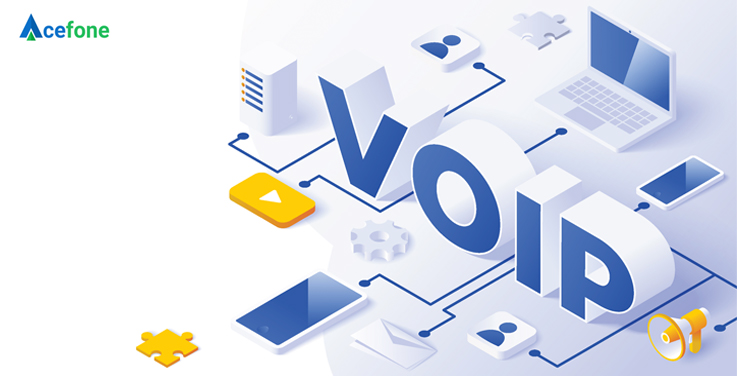If you are thinking about installing VoIP phone system into your business, then it is important to make a well-informed decision on which system to buy.
At Acefone, we understand that VoIP can be confusing to people without technical knowledge and backgrounds as there is a lot of complicated terminologies to get your head around.
So, we have put together 20 VoIP terms you should know, so you can start searching for your new phone system with confidence.
VoIP
VoIP means Voice Over Internet Protocol and means that your phone system works through your internet connection.
VoIP is more common than you might think, and apps most people use daily work through VoIP, such as WhatsApp, Skype and more.
Choose Acefone as your VoIP Service Provider and experience crystal-clear VoIP calls with our reliable network.
IVR
IVR stands for Interactive Voice Response, which is a system that can be added to your phone so customers can choose options based on who they want to speak to.
This is common in many larger businesses with multiple departments and if you call a national company, you are most likely to be greeted with this.
Softphone
This refers to the software used to connect your phone to any device you choose to make calls from; for example your laptop, tablet, or mobile device.
IP Phone
These phones are similar to traditional phones but will have an ethernet cable connecting them to your internet connection.
IP telephony
This refers to any telephone systems which work over an internet connection, similar to VoIP.
Virtual Assistant
A virtual assistant is a service that can be added to your hosted phone system to take messages and answer calls for you when you are either closed or out of the office.
Virtual Assistants can forward messages to your email with the aim of helping you keep up with business and not miss a lead.
Hosted Contact Center
A hosted contact center is different from a traditional contact center, where your staff need to be in physical premises.
A hosted contact center allows calls to come through to one central number and be picked up by your staff anywhere in the world, as they can connect to your phone system remotely.
Cloud-Based Telephony
Cloud-based telephony refers to any phone system which works over your internet connection.
Data from your phone system is securely stored in the cloud, with no need for a physical office – so cloud-based telephony allows you to ensure data is safe and accessible no matter what happens to your office premises.
Call Flipping
Call flipping refers to a hosted phone system’s ability to seamlessly switch a call from device to device.
You could start a call on your desk phone and switch to a mobile or tablet without any interruption to the person on the other end of the line.
Call Monitoring
Call monitoring means you can keep track of all incoming and outgoing calls through your online portal.
You can track everything from agent waiting time to call time and costs so you can be in control of your hosted phone system at all times.
Online portal
An online portal gives you access to all of the amazing features of your hosted phone system, from call recordings to adding extensions – this is the control panel you need to make changes to your phone system and add exciting new features. The online portal is a great tool for managers to access detailed analytics.
Call Continuity
Call continuity refers to the capability of your hosted phone system to maintain a good connection and keep calls coming through.
Poor call continuity and downtime can cause frustrating disconnections and can be detrimental to your business.
Downtime/Uptime
Downtime or uptime, often presented as a percentage, refers to the amount of time your phone system may be offline for maintenance or due to error and which amount of time you should be connected.
The lower the downtime the better your hosted phone system and communications will be.
API Integrations
API’s, or Application Programming Interface, allowing you to connect your phone system to other systems you might use (for example Salesforce or Hubspot).
A hosted phone system with plenty of API integrations will be able to work well with your existing customer relationship management system and will save time and money on administrative tasks.
Hosted PBX
Hosted PBX systems allow you to make and receive calls affordably, through your internet connection and hosted off-site rather than traditional phone lines situated on site.
Extensions
Extensions can be assigned to your staff members so they each have their own personal phone number, they also allow you to monitor staff performance as you will know exactly who is on which extension.
With Acefone, you can enjoy unlimited extensions and can add and remove these through the online portal.
Plugin and Play
Plugin and Play refer to a hosted phone system’s ease of set up. Requiring very little maintenance and infrastructure, a hosted phone system will be installed quickly and easily, so you can plug it in and start working immediately.
Volume Users
Volume users refer to the amount of traffic your hosted phone system can cope with without losing connection.
A high volume means that your phone system is robust enough to support many users calling in and will not let you down when you need it most.
Automation
Automation refers to a hosted phone system’s ability to work with your CRM system, putting leads straight into your system without you needing to take extra steps.
It can also refer to a hosted phone system’s ability to send out automated messages on mass to customers, in the form of text messages or through your IVR system.
Bandwidth
Bandwidth refers to the amount of data your hosted phone system can handle, and the speed you will need to keep calls crystal clear.
There are recommendations of the bandwidth needed to host concurrent calls, your provider should be able to advise you on this during consultancy.
At Acefone, we will keep any technical jargon to a minimum, so you understand exactly which phone system you need and how it will work for you – without the confusion. To find out more call our expert team on 1888-859-0450.














